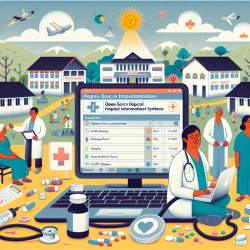In the rapidly evolving world of healthcare technology, open source software offers a beacon of hope for developing countries struggling with limited resources. A compelling study conducted at the Centre Hospitalier Mère-Enfant in Mali explores this potential by implementing the Mediboard open source hospital information system (HIS). This pilot project not only highlights the benefits but also addresses the challenges faced by healthcare institutions in resource-constrained settings.
The Promise of Open Source Software
Open source software is increasingly being recognized for its ability to provide cost-effective solutions without compromising on functionality. The Mediboard project in Mali serves as a testament to this potential. By leveraging open source tools, hospitals can overcome financial barriers and customize systems to meet their unique needs. This flexibility is particularly valuable in developing countries where commercial software solutions are often financially out of reach.
Key Findings from the Mali Pilot Project
- User Acceptance: The study found that 77% of users considered the system very useful, while 85% found it easy to use. This high level of acceptance underscores the usability and practicality of open source solutions.
- Data Reliability: All participants agreed that the system increased data reliability, highlighting its potential to improve patient care and administrative efficiency.
- Local Development: The billing module was fully developed by a local team in Mali, demonstrating how open source projects can foster local expertise and innovation.
Challenges and Recommendations
Despite its successes, the project also faced challenges typical of implementing new technologies in developing regions. These included resistance to change, language barriers, and cultural considerations. Addressing these issues requires a comprehensive strategy that involves:
- Training and Support: Providing adequate training and ongoing support to ensure users are comfortable with new systems.
- Cultural Sensitivity: Understanding and respecting local customs and practices to facilitate smoother adoption.
- Community Engagement: Involving local stakeholders early in the process to build trust and ensure the system meets their needs.
The Way Forward
The pilot project in Mali illustrates that with careful planning and execution, open source HIS can be successfully implemented in developing countries. As these systems mature, they offer a sustainable path forward for improving healthcare delivery and outcomes. Practitioners are encouraged to explore further research and consider adopting open source solutions tailored to their specific contexts.
To read the original research paper, please follow this link: Open source challenges for hospital information system (HIS) in developing countries: a pilot project in Mali.










